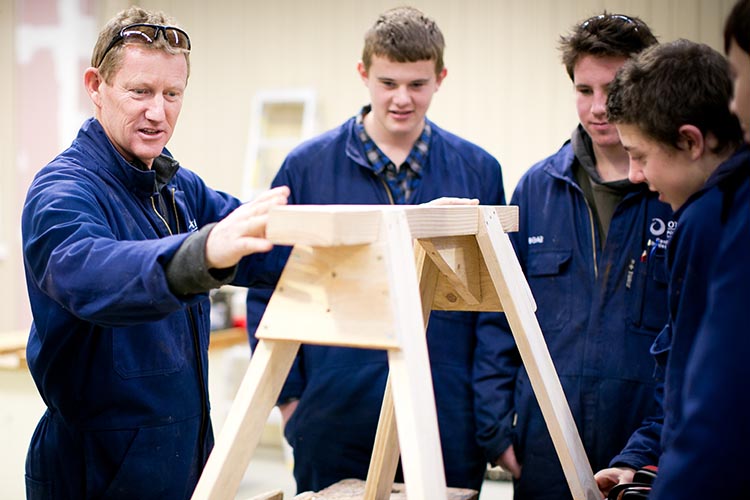Sentences
Improve your writing by learning how to structure sentences in a clear and logical way.
What is a complete sentence?
Sentences provide us with the framework for the clear written expression of our ideas. The aim in writing is always to write in complete sentences which are correctly punctuated.
Sentences always begin with a capital letter and end in a full stop, exclamation mark (avoid using this in academic writing) or question mark.
A complete sentence always contains a verb, expresses a complete idea and makes sense standing alone.
-
Andy reads quickly.
This is a complete sentence as it contains a verb (reads), expresses a complete idea and it does not need any further information for the reader to understand the sentence.
-
When Andy reads.
This is an incomplete sentence. It contains a verb, but the opening word when tells us that something happens when Andy reads; we need more information to complete the idea.
-
When Andy reads, he reads quickly.
This is now a complete sentence, as the whole idea of the sentence has been expressed.
-
The incomplete sentece is highlighted in yellow.
There is another theory. Which should not be ignored.
This is now a complete sentence:
There is another theory which should not be ignored.
-
The incomplete sentence is highlighted in yellow.
The proposal was finally rejected. Although they considered it.
This is now a complete sentence:
Although they considered the proposal, it was finally rejected.
To check that you are writing in complete sentences, read your sentences aloud and pause as indicated by the punctuation. Can each sentence stand alone as a complete thought? If further information is needed to complete the idea, then it is not a complete sentence.

Types of sentences
As well as being able to write in complete sentences, it is important to be able to use a variety of sentence types that are correctly punctuated. Sentences are made up of clauses: groups of words that express a single idea.
There are two types of clauses:
-
Independent clauses - can stand alone as complete sentences.
-
Dependent clauses - need an independent clause to complete their meaning.

Combining clauses
Different types of sentences are made up of different combinations of these two types of clauses.
Types of sentences
Consist of just one independent clause.
A simple sentence requires only one punctuation mark at the end (a full stop, exclamation or question mark).
Example: The essay was late.
This type of sentence is made by joining simple sentences. We join sentences which are closely related in content to make the writing more fluid.
We can join simple sentences with a comma and a word such as: and, but, so, yet.
Examples:
The essay was late, so he lost marks.
We can also join simple sentences with a semi-colon.
The essay was late; he lost marks.
A combination of an independent clause with a dependent clause is called a complex sentence.
Example: The dependent clause in the following example is in italics.
Because his essay was late, he lost marks.
When the dependent clause comes first, as in the example above, it is separated from the independent clause with a comma. When the sentence begins with the independent clause, there is no need to separate the clauses with a comma.
He lost marks because the essay was late.
Comparing these two examples, you can see that the emphasis tends to fall on the clause at the beginning of the sentence. Vary your placement of dependent clauses in order to emphasise the most important idea in the sentence.
Beginning a clause
Some common ways to begin a clause are:
| after | if | though |
| although | if only | unless |
| as long as | in order that | until |
| as though | now that | whenever |
| because | rather than | whereas |
| before | since | wherever |
| even if | so that | while |
| even though |
Multiple dependent clauses
While more than one dependent clause can be used in a sentence, they must always be combined with an independent clause to complete the idea. Again, the dependent clauses in this example are highlighted in green.
Although there are many dissenters, many of whom were prominent citizens, the policy still stands today.
Compound-complex sentence
Different types of sentences can be combined to form compound-complex sentences. In the example below, the central independent clause combines two sentence types. It serves as both the ending of the complex sentence and the beginning of the compound sentence.
When considering owning a pet, you must calculate the cost, or the animal may suffer.
When punctuating a compound-complex sentence, apply the rules for both compound and complex sentences. The example above begins with a dependent clause separated from the central clause by a comma, as in the rule for complex sentences. At the end of the sentence the independent clause is joined by a comma and the word or, as in the rule for the compound sentences.

Using different sentence types
Combining sentences
The following series of short sentences, whilst grammatically correct, are jerky and abrupt.
| Jackie is confident. She is a good speaker. She is considered to be an excellent presenter. Everyone finds her interesting. No one has been critical. She is supportive of others. |
These sentences can be combined to make more fluid writing by combining sentences which are closely related, using the rules described earlier.
| Jackie is confident, and she is a good speaker. She is considered to be an excellent presenter. Everyone finds her interesting, and no one has been critical as she is supportive of others. |
Shortening sentences
The following sentence is overly long and complicated.
| If you consider buying a puppy, whatever age or breed, always consider the type of house you have, as this is the most important first step, because without considering this first you can find yourself with a dog that, despite your good intentions, you just cannot keep. |
By shortening sentences that could confuse the reader, you can make the writing easier to follow.
| If you consider buying a puppy, whatever age or breed, always consider the type of house you have. This is the most important first step. Without considering this first, you can find yourself with a dog that you just cannot keep, despite your good intentions. |
Checking your writing
To check the clarity of your sentence structure, try these tips:
-
Read the writing aloud, stopping as indicated by the punctuation.
-
Ask yourself, does each sentence stand on its own as a complete idea?
-
Use the guidelines to either break an overly long sentence into shorter sentences, or join abrupt sentences together to make the writing more fluid.
Attributions
Hero image: Alphabet letters by _Alicja_. Licensed under a Pixabay.com license
Linking words and phrases. CPIT. (2011). Permission granted to use content.
Image: Pens in a jar by Jessica Lewis. Licensed under a Pexels.com license.
Sentence structure. University of Leicester. Licensed under Creative Commons Attribution-NonCommercial-ShareAlike
Writing for success. The Saylor Foundation. (2013). Licensed under a Creative Commons Attribution-NonCommercial-ShareAlike 3.0 Unported License.
Write clearly: Grammar. McLaughlin Library. Licensed under a Creative Commons Attribution-NonCommercial-ShareAlike 4.0 International License.



